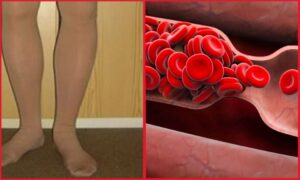8 Subtle Signs of a Blood Clot Your Body Might Be Trying to Warn You About

Every year in the United States, it’s estimated that between 60,000 and 100,000 people lose their lives due to blood clots—a condition that often goes undiagnosed until it’s too late.
Despite medical advances and growing awareness, blood clots remain a serious and often overlooked threat. One of the biggest dangers? Many people don’t recognize the signs until it’s already an emergency.
Understanding the early warning signs your body gives you can be the difference between life and death. Blood clots form when your blood thickens and clumps together inside a vessel, creating an obstruction that disrupts normal blood flow. If not treated in time, they can trigger heart attacks, strokes, or even sudden death.
While some people are more at risk due to genetics, lifestyle, or underlying conditions, blood clots can happen to anyone. The symptoms are often subtle and easy to ignore—which is why knowing what to look for is crucial.
Here are eight signs that might indicate a blood clot is forming somewhere in your body:
1. Swelling in the Lower Leg
One of the most frequent places for a blood clot to develop is in the calf. This condition, called deep vein thrombosis (DVT), occurs when a clot forms in a deep vein, often due to poor circulation or lack of oxygen to the area. The result? Your leg may become swollen, tender, or warm to the touch. There may also be visible redness or changes in skin color.
2. Aching or Tenderness in the Legs
Another classic symptom of DVT is discomfort or pain in the legs, particularly in the calf, ankle, or foot. It may feel like soreness or cramping, especially when standing or walking. Applying gentle pressure to the area might also increase the pain.
3. Red Streaks Near the Veins
If you notice reddish streaks following the path of your veins, this may be a sign that something’s wrong. These marks may feel warm or sore, and in some cases, they could indicate an inflamed vein or even a clot in a superficial vessel that may require urgent attention.
4. Sudden Chest Pain
A blood clot that travels to the lungs—a pulmonary embolism—can cause sharp, stabbing chest pain, often felt on one side. It may mimic the sensation of a heart attack. In some cases, you’ll also experience pressure in the center of the chest or pain that gets worse when you breathe deeply or cough.
5. Trouble Breathing
If you’re suddenly feeling short of breath, particularly when accompanied by chest discomfort, dizziness, or coughing, this could be a red flag for a clot in the lungs. Difficulty breathing is one of the most dangerous signs and should prompt immediate medical attention.
6. Unexplained Dry Cough
If you’re not battling a cold or respiratory infection and develop a persistent dry cough, don’t ignore it—especially if it’s paired with heart palpitations, chest pain, or breathing trouble. In rare cases, the cough may bring up blood-streaked mucus. One notable example is Hollie Olding, a professional soccer player who initially dismissed her cough—only to later discover it was the result of a life-threatening clot in her lungs.
7. Nausea, Vomiting, or Bloody Diarrhea
A blood clot can also occur in your abdomen, often affecting the intestines. This type of clot can trigger sharp stomach pain, vomiting, and diarrhea, sometimes with visible traces of blood. These symptoms are often mistaken for food poisoning or a stomach virus—but if they’re persistent or unusually severe, seek help fast.
8. Intense Headache or Sudden Neurological Symptoms
When a clot blocks a vessel in the brain, it can lead to a stroke. One of the first signs might be a sudden, severe headache unlike any you’ve had before. This can be accompanied by vision problems, slurred speech, numbness on one side of the body, dizziness, or confusion. Any of these symptoms warrant an emergency response.
Final Thoughts
Blood clots don’t always come with dramatic symptoms. In fact, they often start small—just a little leg pain here, a nagging cough there. But dismissing these early clues can be fatal.
By paying attention to your body and acting quickly, you can greatly reduce the risk of complications. Share this knowledge with loved ones—it might save a life.